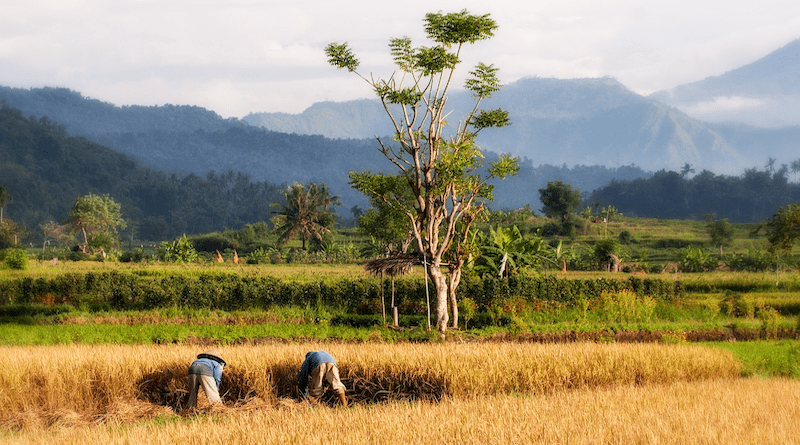Indonesia Discontinues Rice Imports As A Form Of Trade Protection To Boost Domestic Rice Production – OpEd
The agricultural sector is one of the most important and most strategic sectors for the survival of a country, without food the country could be in a position of chaos and bankruptcy. According to data in 2020, the Production of rice in Indonesia is in second place after palm oil as the largest food commodity production figure at 54 million. There are so many ways that the Indonesian government does to maintain the availability of rice, one of the most ways is by importing rice, this import policy reaps a lot of cons because Indonesia is known as an agricultural country or a country with most of the worker in the agricultural sector, but unfortunately, Indonesia continues to import rice.
The data showed that Indonesia imported large amounts of rice in 2018, with an import volume of 2.25 million tons. Indonesia carried out this rice import because it could anticipate an increase in rice prices. At that time, the government was afraid of the supply because the existing rice could not meet the huge demand of the Indonesian market.
In the end, the good news came for Indonesia. Indonesian President Joko Widodo said that finally, for the last 3 years, starting from 2019 to 2021, Indonesia had no longer imported rice. The reason for this policy is that, according to Joko Widodo, the productivity of domestic farmers has increased. Besides that, Joko Widodo also explained that the cause of this high productivity is the infrastructure for the agricultural sector that has been built by the government.
The fact is Indonesian government has not stopped rice imports in the last three years, because, according to Kuntoro, the Head of the Public Relations and Public Information Bureau, Ministry of Agriculture (Kementan), there are still efforts to import rice, but imported rice is special rice, such as for foreign restaurants that require specially imported rice. However, the government generally uses domestically produced rice for public consumption.
On August 14, 2022, the International Rice Research Institute (IRRI) organization presented Indonesia with the Food Self-Sufficiency Award as a result of Indonesia’s accomplishment in sustaining national food security, particularly in staple rice.
Due to the current state of the world, which is experiencing a global food disaster due to the conflict between Ukraine and Russia, many nations have closed the export door to maintain their domestic stock, one of which is India, one of the exporters. Indonesia’s decision to stop importing rice to support local rice does not garner much attention or cause a stir in the international community at this time. With this momentum, Indonesia could discuss how seriously they should stop importing rice, whether it’s for everyday consumption or special rice, even to concentrate on the domestic agricultural industry.
Even though it no longer imports rice, Indonesia is attempting to become a rice exporting country, as stated by Airlangga Hartarto, the Coordinating Minister for the Economy, who stated that Indonesia will export 200,000 tons of rice due to the potential rice production of more than 7 million tons. However, the country of destination for rice exports is not mentioned.
The author strongly agrees with the policy decision made by Indonesia to stop rice imports, because the state should show its seriousness in the agricultural sector, especially rice. So far, Indonesia has been known as an agrarian country, but when you see the reality that Indonesia still imports rice often, it is appropriate for Indonesia to be able to provide its own domestic rice needs. Even with the term an agrarian country which is familiar to many people, Indonesia should be at the level of rice exporting country in high quantity or level. If this trend of rice imports continues to be carried out by Indonesia, there are many things that I fear, starting from the reduction of the next generation in the field of agriculture, because the successors feel that their efforts are not appreciated, because the country prefers to import and in the end, they will choose to work in other sectors. even if this import trend continues, the worst thing that will happen is that Indonesia will be very dependent on the exporting country.
Rice is a very important commodity in the Indonesian people’s lives; there is even a term in Indonesia that says that Indonesian people have not eaten if they have not consumed rice; from this term, it can be seen that rice has become a staple for the Indonesian people. If Indonesia’s situation continues to be dependent on the exporting country, I fear that Indonesia will have no negotiating power against that country. Indonesia will do everything possible to meet its country’s food needs, and with conditions like this, the country will lose its power.
Actually, in addition to the policy of stopping rice imports by Indonesia, Indonesia should also begin to show its seriousness in its efforts to procure land for agriculture, considering that in the current era a lot of agricultural land in Indonesia has been converted into industrial areas, housing, and even offices. The acquisition of more land for the agricultural sector will certainly affect the quantity of rice that can be produced by Indonesia.
Sulthan Haidar Dziban is an International Relations Student, Islamic University of Indonesia

